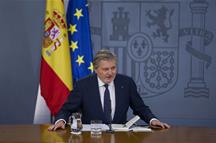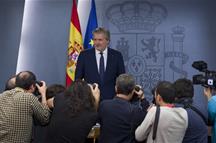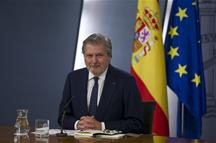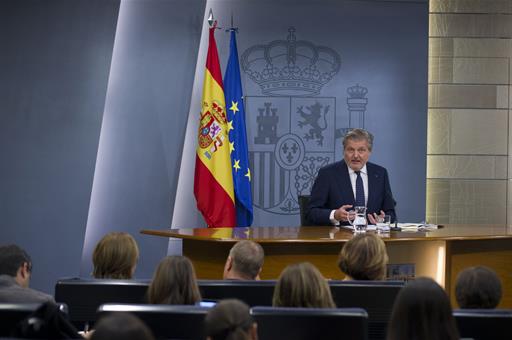Council of Ministers
Government stresses it will meet deficit target agreed with EU
Council of Ministers - 2016.11.4
Moncloa Palace, Madrid
At the first meeting of the Council of Ministers after the Cabinet ministers were sworn in, the Minister for Education, Culture and Sport, Íñigo Méndez de Vigo, who also takes on the post of Government Spokesperson, described the government as "one of continuity regarding that which must be continued - which is economic recovery, job creation, reforms and budget stability - and one of renewal, because I have seen six new faces sat down around the table at the Council of Ministers with a great desire to do things well and to work for the benefit of Spain".
Íñigo Méndez de Vigo began the press briefing following the Council of Ministers by expressing his intention to maintain the same "frank and direct relationship" with the press established by his predecessor in this post, Soraya Sáenz de Santamaría.
Deficit target
The Council of Ministers analysed a report on the situation of the Spanish economy drawn up by the Ministers for Economic Affairs, Industry and Competition, Luis de Guindos, and for the Treasury and Public Function, Cristóbal Montoro. The conclusion, stated Íñigo Méndez de Vigo, is that "the government trusts that it can meet the deficit target of 4.6% of the Gross Domestic Product set by the European Union". The Government Spokesperson stressed that Spain's "credibility" depends, to a large degree, on meeting this target.
Íñigo Méndez de Vigo highlighted the "positive results" of the latest measures adopted in this area: the non-availability agreement for the sum of 2 billion euros, the close of the budget year and the recent Royal Decree on the payment in instalments of Corporate Income Tax for companies with turnover in excess of 10 million euros.
 Pool Moncloa / Diego CrespoThe Minister for the Treasury reported to the Council of Ministers that the revenue from this payment in instalments is heading in "the right direction". Furthermore, the revenue from Personal Income Tax has grown by 6%, VAT payments have increased by 4.4% and special taxes have posted a 1% rise, said Íñigo Méndez de Vigo.
Pool Moncloa / Diego CrespoThe Minister for the Treasury reported to the Council of Ministers that the revenue from this payment in instalments is heading in "the right direction". Furthermore, the revenue from Personal Income Tax has grown by 6%, VAT payments have increased by 4.4% and special taxes have posted a 1% rise, said Íñigo Méndez de Vigo.
The next steps for the government in this area will be the presentation of the updated Budget Plan to Brussels and, "after talking with the political groups", the passage through Parliament of the Draft Budget for 2017, pointed out the Government Spokesperson.
Government commitments
Íñigo Méndez de Vigo also announced that the government "will undertake a raft of commitments, in the near future, that it took on before or during the investiture session".
As regards education, the agreement to set up a sub-committee of the Education Committee in the Lower House of Parliament is going to be implemented to carry out a National Education Pact, "one of the main goals of this term of office". The Government Spokesperson also recalled that Mariano Rajoy announced in the investiture session the suspension of the academic effects of the schedule for the application of the Education Act (Spanish acronym: LOMCE) for evaluations of the 4th year of Compulsory Secondary Education and the 2nd year of Advanced Secondary Education (Bachillerato), which will require a legislative amendment.
As Minister for Education, Íñigo Méndez de Vigo sent out a message of "calm" to all students regarding university entrance exams. These evaluations, he declared, "will be very similar" to the current University Entrance Exams (Spanish acronym: PAU) and a ministerial order to be approved in the coming weeks "will clarify all these models".
 Pool Moncloa / Diego CrespoOn another note, the Council of Ministers debated the upcoming call of the Toledo Pact. "The President of the Government urged this to be done, together with a call for social dialogue", stressed Íñigo Méndez de Vigo. The President of the Government also expressed his commitment to "opening negotiations on a new system of stable and sufficient regional financing with the parliamentary groups, and at the appropriate time, a meeting of the Conference of Regional Presidents will be called in the Upper House of Parliament", according to the Government Spokesperson.
Pool Moncloa / Diego CrespoOn another note, the Council of Ministers debated the upcoming call of the Toledo Pact. "The President of the Government urged this to be done, together with a call for social dialogue", stressed Íñigo Méndez de Vigo. The President of the Government also expressed his commitment to "opening negotiations on a new system of stable and sufficient regional financing with the parliamentary groups, and at the appropriate time, a meeting of the Conference of Regional Presidents will be called in the Upper House of Parliament", according to the Government Spokesperson.
Finally, upon a proposal from the Minister for Agriculture and Fisheries, Food and Environmental Affairs, Isabel García Tejerina, the government tackled the presentation to the Council of Ministers, in the near future, of the Paris Agreement on Climate Change for its subsequent submission to Parliament. This issue, added the Government Spokesperson, may be included as an item on the agenda of the meeting of the Council of Ministers next week.
Dialogue and consensus
In his first appearance before the media, the new Government Spokesperson reported that the President of the Government, Mariano Rajoy, conveyed to the new ministers the need to "talk a lot, discuss a lot and reach consensuses and agreements" whilst always taking into account that Spain must continue along the path of economic recovery and job creation.
When asked about regional financing, Íñigo Méndez de Vigo said that the aim is to achieve "shared dialogue on the situation of the regional model and its financial sufficiency, as well as to update the principles of solidarity and cooperation that have marked its development to date" he added.
 Pool Moncloa / Diego CrespoThe Government Spokesperson clarified that both the Vice-President of the Government, Soraya Sáenz de Santamaría, and the Minister for the Treasury and Public Function, Cristóbal Montoro, "must be present" in the negotiations in order to push through this new model of financing. He also confirmed that Soraya Sáenz de Santamaría "will continue to exercise the political coordination of the government".
Pool Moncloa / Diego CrespoThe Government Spokesperson clarified that both the Vice-President of the Government, Soraya Sáenz de Santamaría, and the Minister for the Treasury and Public Function, Cristóbal Montoro, "must be present" in the negotiations in order to push through this new model of financing. He also confirmed that Soraya Sáenz de Santamaría "will continue to exercise the political coordination of the government".
He also pointed out that Mariano Rajoy will continue to head up the Government Delegate Committee for Economic Affairs and that an attempt will be made to approve the ceiling on spending "as soon as possible through dialogue with political groups".
Íñigo Méndez de Vigo recalled that Mariano Rajoy "has always been open to dialogue" and will receive the President of the Regional Government of Catalonia, Carles Puigdemont, when he can fit him into his schedule, although he pointed out that "he mustn't come with prejudices and 'red lines'". The Government Spokesperson also expressed the government's interest in working with the PSOE because the target of "having 20 million people in work in Spain must be consolidated by the year 2020".
As regards the distribution of power and the continuity of Luis de Guindos and Cristóbal Montoro in the government, Íñigo Méndez de Vigo highlighted the credibility of both and argued that "if it isn't broken, don't fix it". He also underlined the negotiating talent and desire to reach a consensus of Fátima Báñez, Dolors Montserrat and Álvaro Nadal during their negotiations with Ciudadanos to try and form a government.
As regards the school homework strike backed by the Spanish Confederation of Association of School Parents (Spanish acronym: CEAPA), he considers that "this is a bad idea", although he added that this question "could be the subject of debate in the national education pact" that the government will "immediately set in motion in the Lower House of Parliament".
In his role as Minister for Education, Culture and Sport, Íñigo Méndez de Vigo attributed the award of the National Prize for the Best Translation to Luis Baraiazarra to a "series of mistakes", since his work does not comply with the terms and conditions of the award, and apologised to the author for the annulment of his award.





